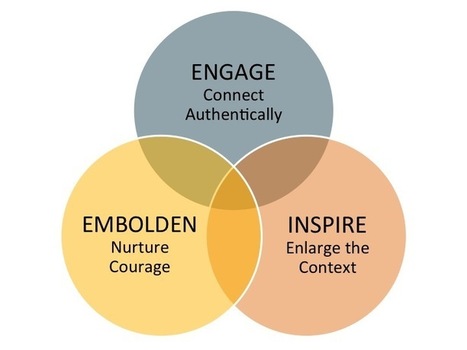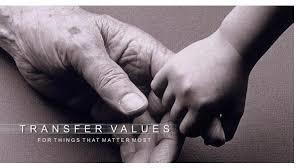Get Started for FREE
Sign up with Facebook Sign up with X
I don't have a Facebook or a X account
 Your new post is loading... Your new post is loading...
 Your new post is loading... Your new post is loading...

Miklos Szilagyi's curator insight,
October 28, 2014 4:38 AM
OK, OK, one more about the presentations... it would be one plus more than needed if this presentation-business were not so difficult (allegedly it's one of the greatest fear to speak publicly - I can attest this...:-)))... So, it is a short one and a good one...:-)))

The Learning Factor's curator insight,
September 10, 2014 7:35 PM
If influencing stakeholders is going to help your project, as well as your performance review, bonus, salary, and future career, then it's important to find out how you can become a better stakeholder influencer. 
Sameed Ahmad's curator insight,
September 11, 2014 11:34 AM
Good idea! |

The Learning Factor's curator insight,
March 13, 2018 5:39 PM
Small talk and cold emailing will only take you so far, but these five tactics can get you noticed—and remembered—for all the right reasons. 
CCM Consultancy's curator insight,
March 18, 2018 2:10 AM
The better way to connect with superstars isn’t to get in front of them and ask them for things. If you want to meet them–and break through and build a lasting connection–the best strategy is to make them come to you.” Here are a few ways to do that.

Dr. Madelyn Blair's curator insight,
December 4, 2017 3:59 PM
There are so many reasons why asking questions are important in your life. Here is another great reason

Mariapia Alloggio - consulente 's curator insight,
March 6, 2018 3:47 PM
Ci piacciono le persone che ci fanno domande ma spesso non ci ricordiamo di restituire il favore. Ed è un'abilità che è utile imparare, le domande sono una dichiarazione di interesse a sapere di più e un implicita dichiarazione di stima perche si vuole sapere cosa ne pensano le altre persone.

The Learning Factor's curator insight,
October 4, 2016 10:30 PM
If you want to influence others' decisions, you've got to understand the mental shortcuts they use to make them.
Andrea Payne's curator insight,
January 27, 2015 3:23 PM
I've been reading "Real Influence" by Robert Ullman and John Goulston (http://www.amazon.ca/Real-Influence-Persuade-Without-Pushing/dp/081442015X), and they talk about the importance of connecting authentically. In Real Influence, Ullman and Goulston refer to this authenticity as "Connected Influence". 
W. Bradley Gooderham's curator insight,
January 28, 2015 4:38 PM
The future need innovators and the present needs innovative teachers to nurture them. Creativity and the ability to innovate are natural characteristics but they must be built up and encouraged in our students, colleagues, and selves. IteratED is committed to bringing out and nurturing the best in all of our faculty and students. We understand that this requires greater autonomy to make decisions and more trust in the natural ability to learn through exploration. Are you a teacher who wants to reach for your highest potential? We are here to help you get there. Contact IteratED for more information on how together we can provide exceptional 21st-century education.
Tony Palmeri's curator insight,
October 24, 2015 12:40 PM
"...Human ingenuity within any organization is it's greatest competitive advantage". This quote alone made me scoop this resource. How do we tap into the resource that is our staff? Engaging with them in the classroom and in the hallways to build communication capacity is important. Inspiring staff to take risks is a tricky enterprise - leaders must value this sort of behavior. This means that attempts which result in failure must be cherished, not scrutinized as they often tend to be.

Hoang-Anh Phan's curator insight,
October 30, 2014 3:22 AM
Stop story tell for a moment. Story listen to understand the reality of your team and organization. This is fundamental in #agile and #holacracy. 
Zeb WATURUOCHA, PhD's curator insight,
October 31, 2014 1:00 AM
It is true that if you don't listen to me, I will not listen to you though I might pretend to be listening because you are my boss. 
Raymond Godding's curator insight,
October 31, 2014 4:01 PM
Leiders die beweging tot stand willen brengen, beginnen met luisteren voordat ze gaan vertellen. |


































https://ammoways.com/product/glock-19-gen-4-slide/
https://ammoways.com/product/hornady-handgun-hunter-9mm/
https://ammoways.com/product/sellier-and-bellot-9mm-124gr/
https://ammoways.com/product/pf940c-frame/
https://ammoways.com/product/federal-hydra-shok-9mm-135-gr-jhp-20rds/
https://ammoways.com/product/winchester-nato-9mm-luger-124-grain-fmj-1000-rounds-ammo-can/
https://ammoways.com/product/9mm-124gr-elite-v-crown-jhp/
https://ammoways.com/product/buy-cci-ammunition-blazer-brass-full-metal-jacket-round-nose-124grain/
https://ammoways.com/product/ppu-mil-spec-brass/
https://ammoways.com/product/winchester-silvertip-9mm-luger-147-grain-ammunition-20-rounds/
https://ammoways.com/product/remington-range-brass-9mm-115-grain-500-rounds-fmj/
https://ammoways.com/product/blazer-brass-9mm-500-rounds-blazer-9mm-500/
https://ammoways.com/product/glock-19-gen-5/
https://ammoways.com/product/glock-19-x-19x-glock/
https://ammoways.com/product/glock-43x-43x/